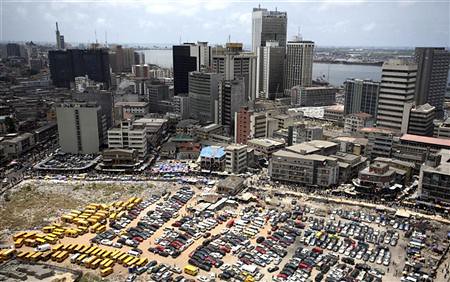
An aerial view shows the central business district in Nigeria's commercial capital of Lagos, April 7, 2009. REUTERS/Akintunde Akinleye , a photo by Pan-African News Wire File Photos on Flickr.
Obama begins new policy to boost trade with Africa
Wednesday, 18 May 2011 00:00 From Laolu Akande
Nigerian Guardian
PRESIDENT Barack Obama of the United States of America is pursuing a unique trade policy with Africa by engaging African governments and partners about new ways to resolve old trade barriers, create better customs practices, and facilitate job-supporting trade for both Americans and Africans.
According to the Deputy U.S. Trade Representative Amb. Demetrios Marantis, who made this disclosure in a statement released yesterday by the U.S. government, there are also various country-specific issues that the U.S. is working with different African nations.
For instance in Nigeria, the U.S. government is engaged with the Federal Government on the issue of “protecting intellectual property rights in Nigeria.”
The U.S. Deputy Trade Representative disclosed that the U.S. had set up a Trade and Investment Framework Agreements (TIFAs) with 12 African countries and regional economic communities, which “provide for broad, substantive dialogue on all aspects of our trade and investment relationship, bringing in agencies and ministries across our governments.”
According to him, through TIFA, the U.S. and African nations have been meeting and discussing and “each discussion is an opportunity to resolve trade barriers, work toward better customs practices, and facilitate job-supporting trade for both sides, from protecting intellectual property rights in Nigeria, to increasing U.S. beef exports to Mauritius, to resolving commercial disputes in Ghana.”
Truly in Nigeria in recent years, the U.S. Embassy in cooperation with the U.S. Department of Justice and the U.S. Department of Homeland Security, and with support from the Nigerian Customs Service (NCS) and Standards Organisation of Nigeria (SON) has conducted training courses on criminal enforcement of intellectual property at the border. The training focused on health and safety aspects of intellectual property enforcement. There was also a U.S. Embassy seminar on intellectual property with Nigerian judges, a workshop on trademark policy and enforcement of intellectual property rights, and a conference on optical disc enforcement.
Marantis added that at the heart of U.S. Africa policy was AGOA, the African Growth and Opportunity Act, which according to him is “creating success after success.”
He said: “Today, AGOA, which allows for the elimination of tariffs on almost all products in the 37 sub-Saharan African countries exports, facilitates over $80 billion in two-way goods.”
The U.S. trade official stated that since implementation in 2001, AGOA had helped to expand and diversify African exports to the U.S. and supplement traditional commodities exports.
Specifically, Marantis observed that since 2001, “non-oil imports from Africa under AGOA and the Generalised System of Preferences have grown by nearly 20 per cent, reaching $4.0 billion in 2010. These imports include apparel, vehicles and parts, chemicals, and agricultural products.”
He also disclosed that the U.S. had signed six Bilateral Investment Treaties (BIT) with sub-Saharan African countries, and it was about to sign the seventh.
He said: “BITs are valuable instruments for facilitating private investment flows, by helping improve confidence in local investment climates. The investments stimulated by these agreements bring much-needed capital and expertise to job-creating industries, deepen trade linkages, and create opportunities for suppliers and workers in both countries.”
The trade official also stated: “The Millennium Challenge Corporation (MCC) is also key to facilitating U.S.-Africa trade and investment. MCC has signed compacts with 13 African countries, totalling nearly $5.5 billion. Many of these compacts are investing in these countries’ trade and investment potential, like agriculture competitiveness in Ghana, better infrastructure in Tanzania, and improving the port in Benin.”
No comments:
Post a Comment